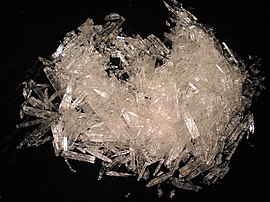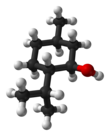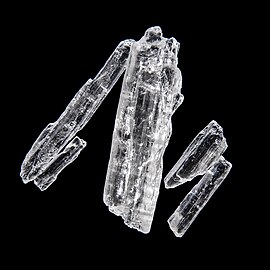
Back Mentol Afrikaans منثول Arabic Mentol AST منتول AZB Ментол Byelorussian Ментол Bulgarian Mentol BS Mentol Catalan Menthol Czech Menthol Welsh
| |||

| |||
| Names | |||
|---|---|---|---|
| Preferred IUPAC name
5-Methyl-2-(propan-2-yl)cyclohexan-1-ol | |||
| Other names
2-Isopropyl-5-methylcyclohexan-1-ol
2-Isopropyl-5-methylcyclohexanol 3-p-Menthanol Hexahydrothymol Menthomenthol Peppermint camphor | |||
| Identifiers | |||
3D model (JSmol)
|
|||
| ChEBI | |||
| ChEMBL | |||
| ChemSpider | |||
| DrugBank | |||
| ECHA InfoCard | 100.016.992 | ||
| EC Number |
| ||
| KEGG | |||
PubChem CID
|
|||
| RTECS number |
| ||
| UNII |
| ||
CompTox Dashboard (EPA)
|
|||
| |||
| |||
| Properties | |||
| C10H20O | |||
| Molar mass | 156.269 g·mol−1 | ||
| Appearance | White or colorless crystalline solid | ||
| Odor | mint-licorice | ||
| Density | 0.890 g·cm−3, solid (racemic or (−)-isomer) | ||
| Melting point | 36–38 °C (97–100 °F; 309–311 K) racemic 42–45 °C, (−)-isomer, α crystalline form | ||
| Boiling point | 214.6 °C (418.3 °F; 487.8 K) | ||
| Slightly soluble, (−)-isomer | |||
| Hazards[1] | |||
| Occupational safety and health (OHS/OSH): | |||
Main hazards
|
Irritant, flammable | ||
| GHS labelling: | |||

| |||
| Warning | |||
| H315, H319 | |||
| P264, P280, P302+P352, P305+P351+P338, P332+P313, P337+P313, P362 | |||
| NFPA 704 (fire diamond) | |||
| Flash point | 93 °C (199 °F; 366 K) | ||
| Safety data sheet (SDS) | External MSDS | ||
| Related compounds | |||
Related alcohols
|
Cyclohexanol, Pulegol, Dihydrocarveol, Piperitol | ||
Related compounds
|
Menthone, Menthene, Menthane,Thymol, p-Cymene, Citronellal | ||
| Supplementary data page | |||
| Menthol (data page) | |||
Except where otherwise noted, data are given for materials in their standard state (at 25 °C [77 °F], 100 kPa).
| |||
Menthol is an organic compound, specifically a monoterpenoid, that occurs naturally in the oils of several plants in the mint family, such as corn mint and peppermint. It is a white or clear waxy crystalline substance that is solid at room temperature and melts slightly above. The main form of menthol occurring in nature is (−)-menthol, which is assigned the (1R,2S,5R) configuration.
For many people, menthol produces a cooling sensation when inhaled, eaten, or applied to the skin, and mint plants have been used for centuries for topical pain relief and as a food flavoring. Menthol has local anesthetic and counterirritant qualities, and it is widely used to relieve minor throat irritation. Menthol also acts as a weak κ-opioid receptor agonist.
- ^ "l-Menthol". pubchem.ncbi.nlm.nih.gov.
- ^ "Safety Data Sheet" (PDF). Reckitt Benckiser. 27 October 2016. Retrieved 3 August 2018.



